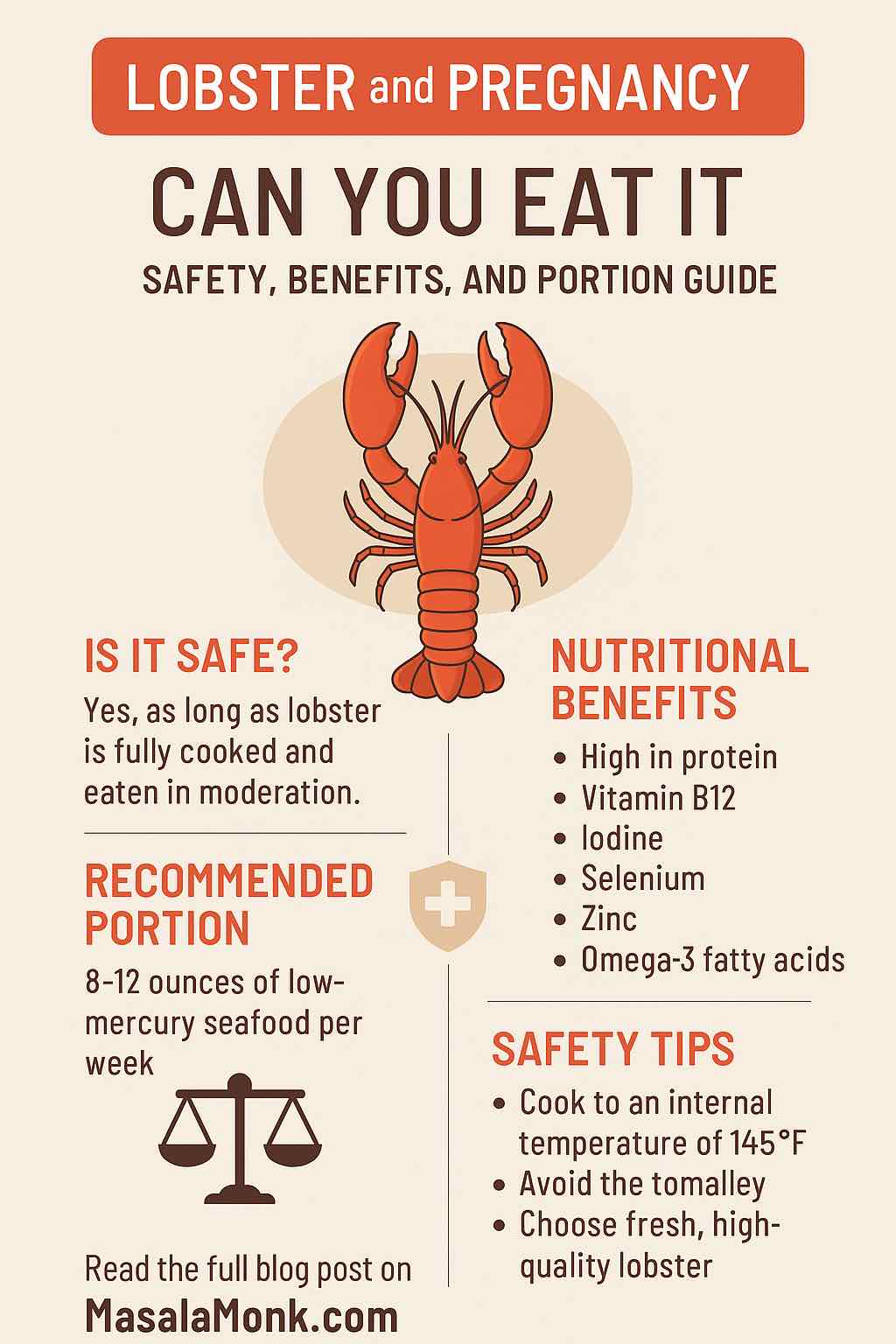
Quick Safety, Nutrition, and Cooking Guide for Moms-to-Be
Pregnancy comes with a lot of joy — and a lot of questions about what’s safe to eat.
If you’re a seafood lover, one of those questions might be:
“Can I eat lobster while pregnant?”
The short answer: Yes, you can — as long as it’s cooked thoroughly, eaten in moderation, and sourced fresh.
Lobster is not only safe during pregnancy, it’s also nutrient-rich and low in mercury, making it a smart seafood choice when prepared correctly.
In this guide, we’ll dive into the research, nutrition benefits, safe cooking tips, portion sizes, and recipe ideas so you can enjoy lobster confidently during pregnancy.
Why Lobster Can Be a Healthy Choice During Pregnancy
Lobster is considered a low-mercury seafood by the U.S. FDA and EPA, putting it in the “Best Choice” category for expectant mothers.
Nutritional Benefits
A 3-ounce (85g) serving of cooked lobster provides:
- Protein – Supports tissue building and repair for mother and baby.
- Vitamin B12 – Essential for neurological development.
- Iodine – Crucial for thyroid function and metabolism.
- Selenium & Zinc – Boost immunity and support cellular health.
- Choline – Important for fetal brain and spinal cord development.
- Omega-3 Fatty Acids (EPA, DHA) – Aid in brain and eye development (though less DHA than oily fish).
Mercury Levels
- Average mercury content: 0.107 ppm — well below the safety threshold.
- Compared to high-mercury fish like swordfish or king mackerel, lobster is a safe and reliable choice.
For an overview of other low-mercury seafood options, explore our Guide to Seafood and Pregnancy.
What the Latest Research Says
Seafood Intake and Pregnancy Outcomes
- 2024 Italian Study – Women who ate a variety of low-mercury seafood had lower risks of gestational diabetes, better birth weights, and fewer complications.
- FDA & WHO Guidelines – Recommend 8–12 ounces of low-mercury seafood per week for optimal maternal and fetal health.
- Neurodevelopment Benefits – Children of mothers who consumed the recommended seafood amounts had improved cognitive scores.
While lobster is lower in DHA than salmon or sardines, it still provides valuable nutrients and is a great protein option when included in a varied seafood diet.
How Much Lobster Can You Eat While Pregnant?
Follow the FDA/EPA recommendation:
- 8–12 ounces per week of low-mercury seafood (2–3 servings).
- That could mean one lobster meal a week plus other fish like salmon, trout, or shrimp.
- Spread intake across the week instead of eating all in one sitting.
Lobster Safety Guidelines for Pregnancy
1. Cook Thoroughly
- Internal temperature: 145°F (63°C).
- The flesh should be opaque, pearly white, and flake easily.
- Avoid raw or undercooked lobster (including sushi, ceviche, or lightly steamed versions).
2. Avoid the Tomalley
- The green liver-like substance can contain PCBs, mercury, and red tide toxins.
3. Source Fresh Lobster
- Buy from trusted fishmongers or reputable restaurants.
- If cooking at home, keep refrigerated and cook within 24 hours of purchase.
4. Handle Leftovers Safely
- Refrigerate promptly and consume within 1–2 days.
- Reheat to steaming hot before eating.
For safety tips with similar shellfish, see Shellfish and Pregnancy and Crab and Pregnancy.
What About Lobster Rolls and Cold Lobster?
Lobster rolls can be safe during pregnancy if:
- The lobster is fully cooked.
- The roll is freshly prepared and served promptly.
- Avoid pre-made or long-stored lobster salads from delis.
Cold lobster (like in salads) is fine only if it was cooked first, then properly refrigerated, and consumed within 24 hours.
Balancing Lobster with Other Seafood
Lobster is nutritious, but it’s lower in DHA compared to oily fish.
For maximum benefits:
- Pair lobster with DHA-rich fish like salmon, sardines, trout, or herring.
- Include iron-rich shellfish like mussels, clams, and scallops — see our Scallops and Pregnancy guide for tips.
This mix helps you meet nutritional needs while keeping mercury exposure low.
Pregnancy-Friendly Lobster Recipes
Here are some delicious ways to enjoy lobster without compromising safety:
1. Light Lobster Salad
Combine cooked lobster meat with Greek yogurt, lemon juice, chopped celery, and dill. Serve in whole-grain pita pockets.
2. Lobster and Vegetable Stir-Fry
Quickly sauté lobster meat with colorful vegetables in olive oil, garlic, and ginger.
3. Indian-Style Lobster Curry
Simmer lobster in coconut milk with turmeric, cumin, coriander, and mild chili for a warm, digestion-friendly dish.
4. Lobster Corn Chowder
Sweet corn, diced potatoes, and lobster in a creamy or coconut milk broth — hearty and comforting.
5. Whole-Wheat Lobster Rolls
Mix lobster with light mayo, parsley, and lemon juice, then fill warm whole-wheat buns.
For more seafood meal ideas, visit Motherhood and Meals: 5 Omega-3 Rich Seafood Recipes for Pregnancy.
Practical Tips for Including Lobster in Your Diet
- Plan ahead – Buy lobster on days you can cook soon after purchase.
- Balance your week – Alternate between lobster and DHA-rich seafood.
- Pair with vegetables and whole grains – For a complete, nutrient-packed meal.
- Watch sodium – Avoid heavily salted or butter-heavy lobster dishes too often.
The Bottom Line
Yes — you can enjoy lobster during pregnancy.
When cooked thoroughly, eaten in recommended portions, and balanced with other low-mercury seafood, lobster can be a safe, delicious, and nutritious part of your pregnancy diet.
Pregnancy is a time to nourish both yourself and your baby — and with the right choices, you don’t have to give up the flavors you love.
Treat yourself to that lobster dinner — just make sure it’s fresh, fully cooked, and part of a balanced diet.
Frequently Asked Questions About Lobster and Pregnancy
1. Can pregnant women eat lobster?
Yes — pregnant women can safely eat lobster if it is fully cooked. Lobster is a low-mercury seafood listed as a “Best Choice” by the FDA, making it a safe and nutritious option during pregnancy.
2. Is lobster safe during pregnancy?
Yes — as long as it’s cooked to an internal temperature of 145°F (63°C) until the meat is opaque and flaky. Avoid raw or undercooked lobster to prevent foodborne illness.
3. How much lobster can I eat while pregnant?
Follow the FDA/EPA guideline: 8–12 ounces (about 2–3 servings) of low-mercury seafood per week, which can include lobster. Balance your weekly seafood intake with other nutrient-rich fish like salmon or sardines.
4. Can I eat lobster rolls while pregnant?
Yes — if the lobster meat is fully cooked and freshly prepared. Avoid pre-made lobster rolls from deli cases that may have been stored for long periods.
5. Can you eat lobster during early pregnancy?
Yes — cooked lobster is safe during early pregnancy and provides valuable nutrients like protein, vitamin B12, and iodine. Just be extra cautious with freshness and cooking.
6. What are the nutritional benefits of lobster for pregnancy?
Lobster provides high-quality protein, vitamin B12, iodine, selenium, zinc, choline, and small amounts of omega-3 fatty acids, all of which support maternal health and fetal development.
7. Is lobster good for pregnancy nutrition?
Yes — lobster offers important vitamins and minerals with relatively low calories and fat. However, it’s lower in DHA than oily fish, so pair it with salmon, trout, or sardines for a balanced omega-3 intake.
8. Should I avoid any part of the lobster during pregnancy?
Yes — avoid the tomalley (the green liver-like part), as it can store toxins such as PCBs and red tide poisons.
9. Can pregnant women eat cold lobster salad?
Only if it was cooked first, promptly chilled, and stored properly for less than 24 hours. When in doubt, reheat until steaming hot before eating.
10. How can I include lobster in a healthy pregnancy diet?
Enjoy lobster with vegetables, whole grains, and light sauces. Try recipes like lobster salads with Greek yogurt dressing, vegetable stir-fries, or coconut milk-based lobster curry.










